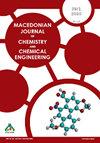用于生物医学应用的单步电泳沉积羟基磷灰石/聚乙烯醇/壳聚糖/庆大霉素涂层
IF 0.6
4区 化学
Q3 CHEMISTRY, MULTIDISCIPLINARY
Macedonian Journal of Chemistry and Chemical Engineering
Pub Date : 2023-12-25
DOI:10.20450/mjcce.2023.2775
引用次数: 0
摘要
采用恒压法,从水悬浮液中通过电泳沉积工艺(EPD)在钛上制备了羟基磷灰石/聚(乙烯醇)/壳聚糖/庆大霉素生物复合涂层。 在 37 °C 的模拟体液(SBF)中浸泡后,通过场发射扫描电子显微镜(FE-SEM)、傅立叶变换红外光谱(FT-IR)和 X 射线衍射(XRD)对沉积涂层进行了表征。释放出的庆大霉素浓度是用高效液相色谱法(HPLC)和质谱仪(MS)测定的。释放曲线证实了最初的 "爆发释放效应",在最初的 48 小时内释放了约 30% 的庆大霉素,这有助于防止生物膜的形成。在金黄色葡萄球菌 TL 和大肠杆菌 ATCC 25922 菌株上采用琼脂扩散法证明了其抗菌活性。通过对 MRC-5 和 L929 成纤维细胞系进行染料排除试验 (DET) 测试了细胞毒性,两种涂层均表现出无毒性。结果表明,基于聚乙烯醇的生物复合涂层具有很高的医疗应用潜力。本文章由计算机程序翻译,如有差异,请以英文原文为准。
Single-step, electrophoretically deposited hydroxyapatite/poly(vinyl alcohol)/chitosan/gentamicin coating for biomedical applications
Biocomposite hydroxyapatite/poly(vinyl alcohol)/chitosan/gentamicin coatings were fabricated on titanium by electrophoretic deposition process (EPD) from an aqueous suspension using the constant voltage method. Characterization of the deposited coatings was performed by scanning electron microscopy with field emission (FE–SEM), Fourier transform infrared spectroscopy (FT–IR) and X-ray diffraction (XRD) after immersion in simulated body fluid (SBF) at 37 °C. The concentration of the released gentamicin was determined using a high-performance liquid chromatography (HPLC) coupled with a mass spectrometer (MS). The release profile confirmed an initial “burst-release effect” with ~ 30% of gentamicin released in the first 48 h, which could be of assistance in the prevention of biofilm formation. Antibacterial activity was proven by the agar diffusion method on Staphylococcus aureus TL and Escherichia coli ATCC 25922 bacterial strains. Cytotoxicity was tested by the dye exclusion test (DET) on MRC-5 and L929 fibroblast cell lines, with both coatings expressing nontoxicity. The results showed the high applicability potential of a poly(vinyl alcohol)-based biocomposite coating for medical purposes.
求助全文
通过发布文献求助,成功后即可免费获取论文全文。
去求助
来源期刊
CiteScore
1.60
自引率
20.00%
发文量
14
审稿时长
>12 weeks
期刊介绍:
Macedonian Journal of Chemistry and Chemical Engineering (Maced. J. Chem. Chem. Eng.) is an official publication of the Society of Chemists and Technologists of Macedonia. It is a not-for-profit open acess journal published twice a year. The journal publishes original scientific papers, short communications, reviews and educational papers from all fields of chemistry, chemical engineering, food technology, biotechnology and material sciences, metallurgy and related fields. The papers published in the Journal are summarized in Chemical Abstracts.

 求助内容:
求助内容: 应助结果提醒方式:
应助结果提醒方式:


